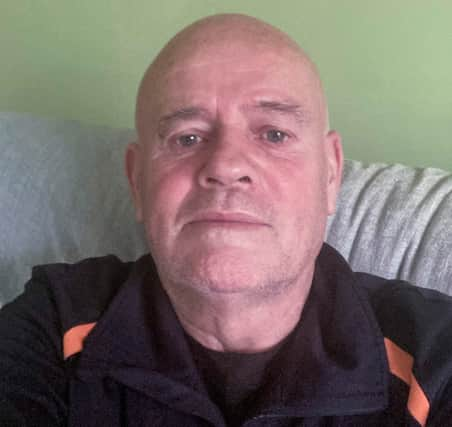St Leonards stroke survivor urges people to check for ‘silent condition’ which can cause serious strokes


Mick Johnson’s stroke was caused by atrial fibrillation or ‘AF’, where the heart beats with an irregular rhythm. When this happens, the heart won’t empty all of the blood out of its chambers with every beat and the leftover blood can form clots which travel to the brain, blocking off blood flow and causing a stroke.
The Stroke Association is urging people to mark Stroke Prevention Day on Thursday January 12, by checking their own pulse to make sure it’s not irregular.
Advertisement
Hide AdAdvertisement
Hide AdMick, a 65-year-old retired water engineer, had a stroke at home in July last year.
“I was suffering bad headaches,” said Mick. “I got up on Sunday morning to go to the loo and hit the floor. I was there for a couple of hours. I couldn’t get up, couldn’t do anything. I was out of it. Then I rang my son and he took me to the Conquest Hospital. They sent me for a scan, said I’d had a stroke and transferred me to Eastbourne.”
Four days later he was well enough to go home but had a heart monitor inserted which gave readings that Mick had to send back to the hospital. This detected his AF which doctors say caused his stroke.
“I had never heard of AF. They put me on anti-coagulants because I’d got it but couldn’t say what might have caused it. The valves in my heart are messing about, they don’t pump properly.
Advertisement
Hide AdAdvertisement
Hide Ad“I have to send them results every week. The monitor will last three years and they say they’ll probably leave it there after that. They still haven’t said if it will need to be treated in any other way. They’re keeping an eye on it and if it gets worse they’ll let me know.”
Mick now wants to raise awareness of AF and urges others to check their pulse and contact their GP practice if they detect any irregularity.
Mick is now recovering from his stroke and exercising to build up his strength, which will also help with his diabetes, high blood pressure and cholesterol.
“I don’t feel quite there,” said Mick. “I feel out of it and have headaches that come and go. Sometimes I get up and feel fine, other times I feel dizzy.
Advertisement
Hide AdAdvertisement
Hide Ad“My blood pressure was still high so they upped my medication and my diabetes is in remission through diet.
“I don’t have as much strength as I used to. I started exercising and the specialist said that would be good for me.
“I’ve started running again. A gentle four or five miles and see how it goes. Walking is good, apart from sometimes I feel dizzy but it takes time get back to normal for me. It’s only been five months since my stroke. Nobody can tell you how long it will be before you feel right again.”
It is estimated that around half a million people in the UK are living with undiagnosed AF. It is linked to around one in five strokes and strokes in people with AF are more severe and are more likely to result in death or serious disability.
Advertisement
Hide AdAdvertisement
Hide AdA survey by the Stroke Association to mark Stroke Prevention Day on Thursday January 12 revealed that almost three in four people (69 per cent) in the South East did not know that AF is a major cause of stroke.
The charity has a video guide on its website at www.stroke.org.uk/spd23 showing people how they can check their own pulse on their wrist or neck.
Nick O’Donohue, the Stroke Association’s associate director for the South East, said: “It's worrying that so few people know that a little thing like how your heart beats can lead to a massive stroke.
“AF often has no symptoms and a stroke can strike without warning. Don’t let the first sign of your AF be a sudden and life-changing stroke. With early diagnosis and effective management of AF, your risk of a stroke dramatically decreases so it’s vital to get checked regularly.
Advertisement
Hide AdAdvertisement
Hide Ad“It’s really easy to check your own pulse and our research told us that most people are able to. Feel for your pulse on your wrist or neck to make sure it has a regular beat. If you suspect you have an irregular pulse, contact your GP Practice.”